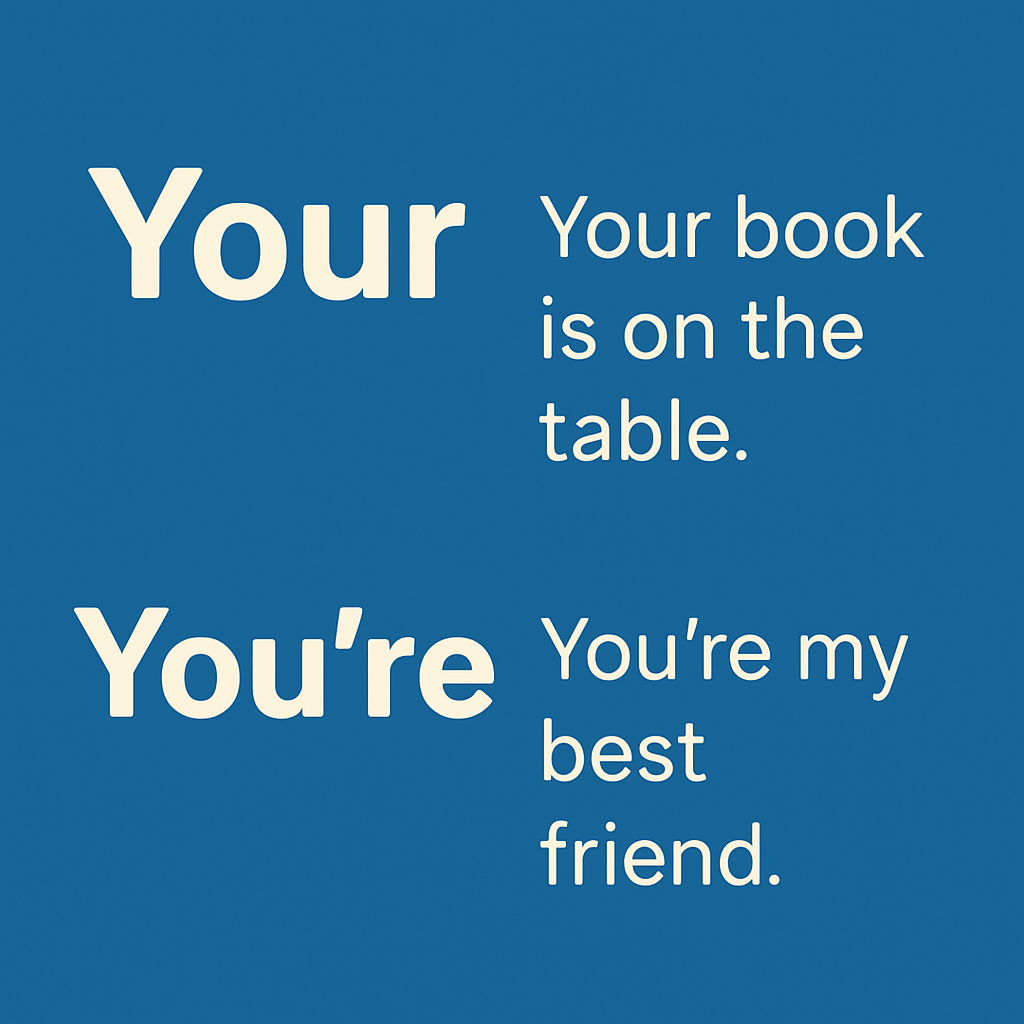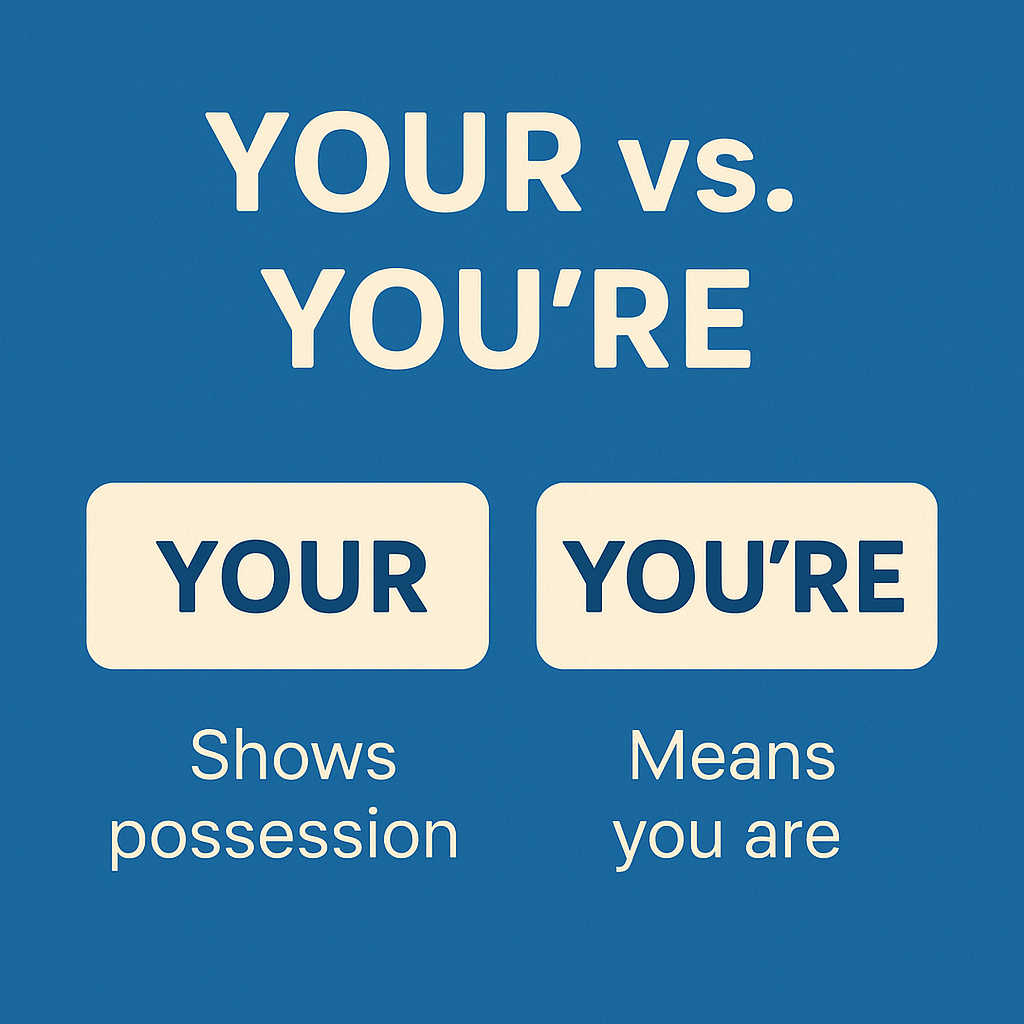Have you ever typed “Your amazing!” and later realized something was wrong? If yes, you’re not alone. Many people confuse similar-sounding words in English, such as its vs it’s or your vs you’re. Confusing “your” and “you’re” is one of the most frequent mistakes in English—especially in casual messages, emails, and social media.
Let’s break it down simply so you’ll never mix them up again.
Table of Contents
✅ What Does “Your” Mean?
“Your” is a possessive adjective. That means it shows something belongs to you. It’s always followed by a noun—something you own or relate to.
🔸 Examples:
- I liked your presentation.
- Is this your backpack?
- Please share your opinion in the meeting.
📘 Your is a possessive form of you (Grammarly).
✅ What Does “You’re” Mean?
“You’re” is a contraction of “you are.” It describes someone or something using an action or quality.
🔸 Examples:
- You’re late again! (You are late again.)
- I think you’re ready for the challenge. (You are ready.)
- Let me know when you’re available. (You are available.)
To test it, try saying “you are” in place of “you’re.” If it sounds right, you’re good to go!
📘 Merriam-Webster confirms “you’re” is simply the short form of “you are.”
🧠 Quick Tip to Remember
Ask yourself:
Can I replace the word with “you are”?
- ✅ If yes → use you’re
- ❌ If no → use your
Example:“___ going to love this recipe.”
Try “You are going to love this recipe.” → ✅ Makes sense → Use you’re

❌ Common Mistakes And How to Avoid Them
Mixing up your and you’re is one of the most frequent grammar errors—especially in casual writing like social media posts or text messages.
🛠 To avoid this:
- Read your sentence out loud.
- Substitute “you are” to double-check.
- Use grammar tools like Grammarly or Hemingway App to catch errors.
| ❌ Incorrect | ⚠️ Why It’s Wrong | ✅ Correct |
| Your welcome | “Welcome” isn’t something owned | You’re welcome |
| You’re keys are on the table | “You’re” means “you are” (doesn’t fit here) | Your keys are on the table |
| Is this you’re phone? | Again, “you are phone” makes no sense | Is this your phone? |
💬 Everyday Usage Examples
| Context | Correct Usage |
| Compliment | “You’re really talented.” |
| At school | “Don’t forget your assignment.” |
| In a chat | “You’re going to love this!” |
| At work | “Can I get your feedback?” |
🤔 Why This Mix-Up Happens
The problem is simple: “Your” and “you’re” sound exactly the same. They’re homophones—words that sound alike but mean different things. But while it’s a common error, especially in informal writing, it can still impact how your message is perceived.
Using the correct word not only polishes your grammar—it also makes your writing more professional and credible.
📌 Frequently Asked Questions (FAQs)
Q: What is the difference between your and you’re?
A: “Your” shows ownership (like your book). “You’re” is short for “you are” (like you’re smart).
Q: How can I tell if it should be your or you’re?
A: Replace the word with “you are.” If it fits, use “you’re.” If not, use “your.”
Q: Can you give an example of your vs you’re?
A: Sure! “Your shoes are muddy” vs “You’re wearing muddy shoes.”
Q: Is it your welcome or you’re welcome?
A: It’s “you’re welcome” because it means “you are welcome.”
Q: Why do people often get your and you’re wrong?
A: They sound the same when spoken, which causes confusion during writing—especially in fast or casual communication.
Conclusion
The difference between your and you’re may be small in spelling but big in meaning. Once you remember that your is possessive and you’re means you are, it gets easier to get them right.
Want to improve your grammar even more? Check out our post on then vs than for another commonly confused pair.

